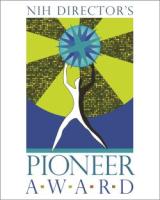Eligibility
- Eligibility
- Application Processnot completed
- After Submissionnot completed
- Award Managementnot completed
Disclaimer:
The information in these pages is meant to provide general guidance. Instructions and procedures outlined in the funding opportunity, SF424 Application Guide, and NIH Grants Policy Statement take precedence over any information provided and should be referred to for complete and comprehensive directions.
The Pioneer Award supports individual scientists of exceptional creativity who propose bold and highly innovative research projects with the potential to produce a major impact on broad, important areas relevant to the mission of NIH. The proposed research must be pioneering and reflect substantially different scientific directions from those already being pursued in the investigator’s research program or elsewhere.
Applications are welcome in all research areas broadly relevant to the mission of NIH. These areas include, but are not limited to, the behavioral, medical, natural, social, applied, and formal sciences. Research may be basic, translational, or clinical. The primary requirements are that the research be highly innovative and have the potential for unusually broad impact.
Steps to Determine Your Eligibility
Fit NIH Mission and Goals
NIH seeks fundamental knowledge about the nature and behavior of living systems and the application of that knowledge to enhance health, lengthen life, and reduce illness and disability. The Pioneer Award welcomes all areas of research relevant to this mission, including (but not limited to) topics in behavioral, medical, natural, social, applied, and formal sciences. Research may be basic, translational, or clinical. The primary requirements are that the research be highly innovative and have the potential for unusually broad impact.
Fit the Purpose of the Pioneer Award
The Pioneer Award supports individual scientists of exceptional creativity who propose pioneering, highly innovative, and broadly impactful research towards the ultimate goal of enhancing human health. The emphases are on the qualities of the investigator, the innovativeness, and potential impact of the proposed research. Preliminary data and detailed experimental plans are not requested. The award seeks pioneering research that is a significant departure from what is currently being pursued in the investigator’s research program or elsewhere. The Pioneer Award is not intended to expand a current research program into the area of the proposed project. While the research direction may rely on the applicant’s prior work and expertise as its foundation, it cannot be an obvious extension or scale-up of a current research enterprise. Rather, the proposed project must reflect a fundamental new insight which may involve exceptionally innovative approaches and/or radically unconventional hypotheses.
Meet the Eligibility Requirements
Any eligible individual with the skills, knowledge, and resources necessary to carry out the proposed research as the Program Director/Principal Investigator (PD/PI) is invited to work with his/her institution to develop an application.
Only single PD/PI applications are allowed.
Pioneering Approach
The proposed Pioneer Award research must take on a new research direction that is substantially different from the ideas currently being pursued by the investigator or others. Successful Pioneer Award applicants are expected to propose highly innovative (and inherently risky) approaches to address or solve exceptionally important problems of relevance to NIH. While a new research direction may have as its foundation the applicant’s prior work and expertise, it cannot be an obvious extension or scaling up of a research enterprise. The new research direction must reflect a fundamental new insight into the solution of a problem, which may derive from the development of exceptionally innovative approaches and/or from the posing of radically unconventional hypotheses.
Applications for projects that are straightforward extensions of ongoing research should not be submitted.
Research Effort
Pioneer award recipients are required to commit the major portion of their research effort (more than 6 person-months or at least 51%) to the Pioneer Award project in the first 3 years of the project period. Effort expended toward teaching, administrative, or clinical duties are not included in this calculation. Award recipients may reduce effort towards the Pioneer Award project to a minimum of 4 person-months (33%) in the fourth year and a minimum of 3 person-months (25%) in the fifth year. The effort reduction is to provide time for the transition to other sources of support since Pioneer Awards cannot be renewed.
Applicants with current research commitments equal to 6 person-months or more must adjust their effort on existing grants during the award period in order to devote the required minimum effort to the Pioneer Award project. Investigators who are not able to meet the effort requirement should not submit applications.
Get Additional Questions Answered
If you still have questions about your eligibility, check out the Frequently Asked Questions section and past Q&A webinar posted on the website. You can also contact NIH staff at [email protected].
More questions? Contact us at [email protected].



